18+ SAMPLE Parenting Agreement
-
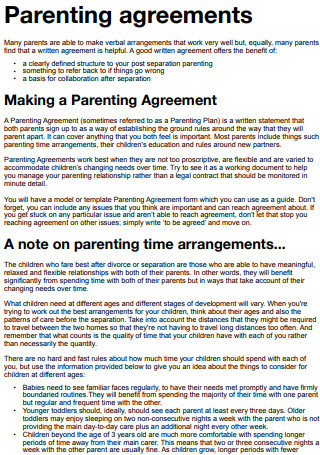
Parenting Agreement
download now -
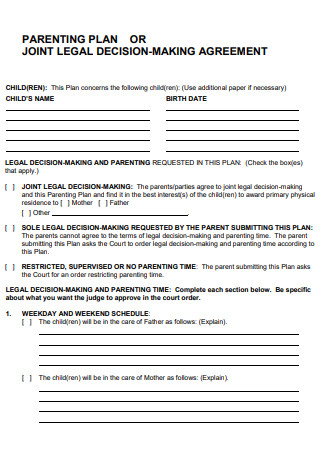
Parenting Joint Legal Decision-Making Agreement
download now -
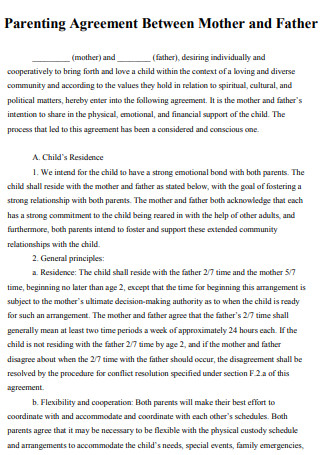
Parenting Agreement Between Mother and Father
download now -

Changing Parenting by Agreement of parties
download now -
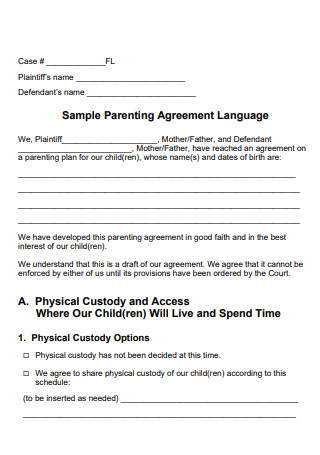
Parenting Agreement Language
download now -
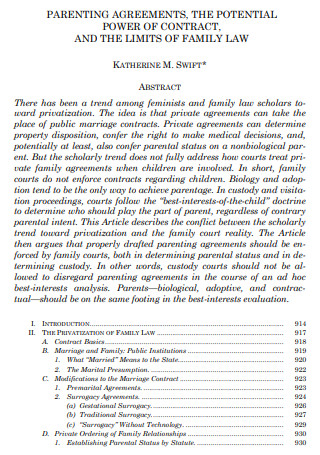
Parenting Agreement Contract
download now -
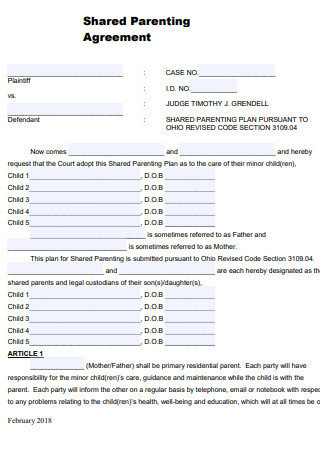
Shared Parenting Agreement
download now -
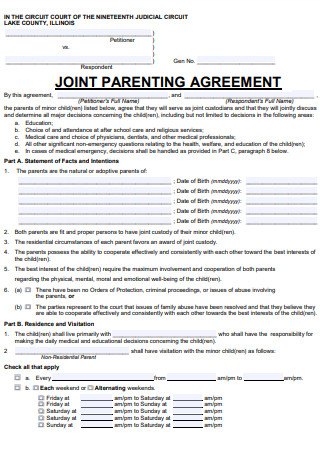
Joint Parenting Agreement
download now -
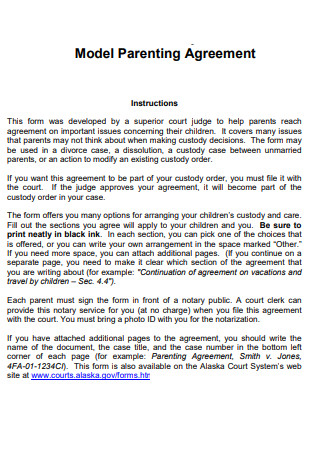
Model Parenting Agreement
download now -
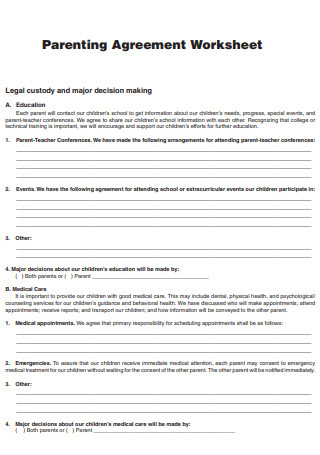
Parenting Agreement Worksheet
download now -
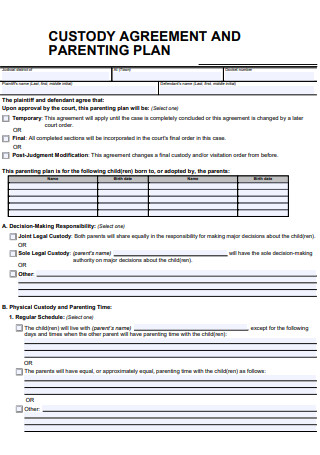
Parenting Custody Agreement
download now -
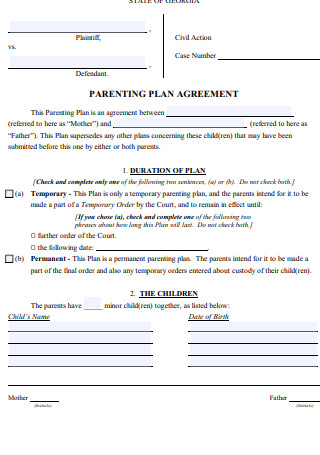
Parenting Plan Agreement
download now -
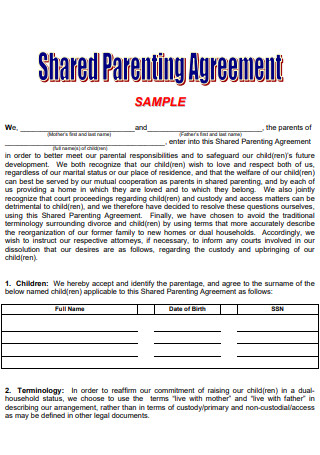
Parenting Agreement Example
download now -
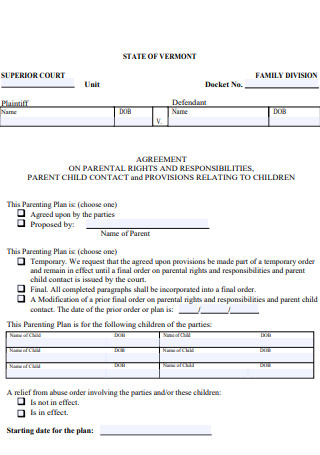
Simple Parenting Agreement
download now -
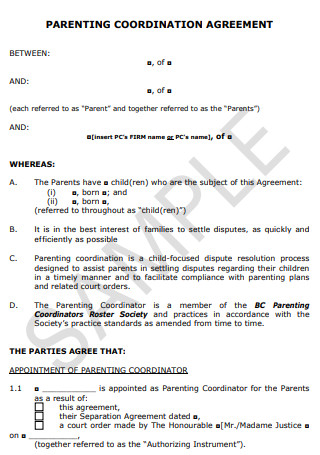
Parenting Coordination Agreement
download now -
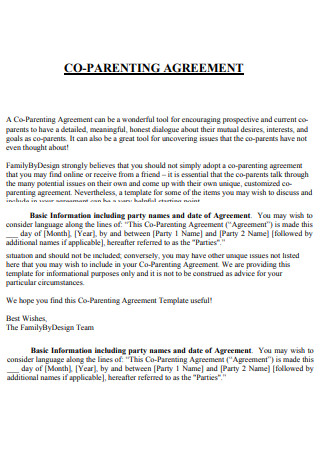
Co-Parenting Agreement
download now -
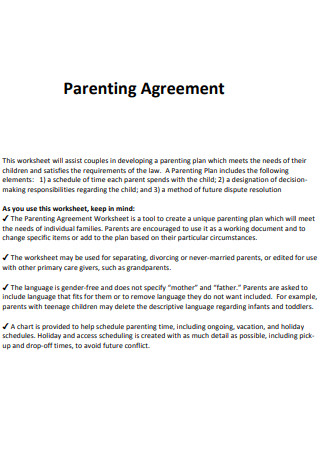
Sample Parenting Agreement
download now -
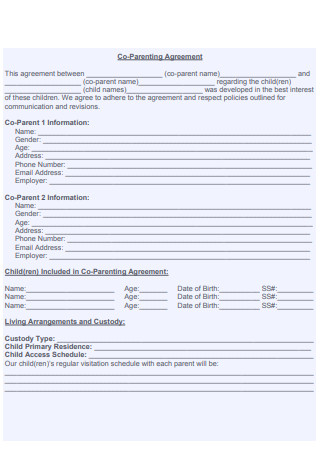
Sample CoParenting Agreement
download now -
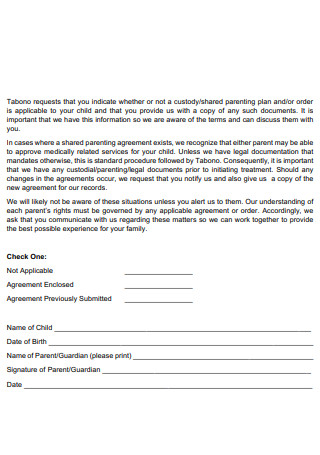
Custody Parenting Agreement Form
download now
FREE Parenting Agreement s to Download
18+ SAMPLE Parenting Agreement
a Parenting Agreement?
Benefits of Positive Parenting
Tips To Improve Your Parenting Skills
How To Have an Effective Parenting
FAQs
At what age might a youngster express an unwillingness to visit a parent?
What is the minimum age at which a child may choose to live with a parent?
Who is legally accountable for a child?
What Is a Parenting Agreement?
A parenting agreement is a written document that you and your ex-spouse draft together to detail how you and your ex-spouse will handle child care following your divorce. By establishing an agreement, both parents will understand what the other expects of them and will be able to avoid the friction that frequently occurs during separation. Every child requires stability, and divorce disrupts even the most controlled program. A thorough parenting agreement can help mitigate some of the negative consequences of divorce by providing children with a scheduled visitation schedule, eliminating the ongoing concern of “where am I going today?” Perhaps you’ve heard parenting plans referred to as custody agreements, co-parenting agreements, or arrangements for parenting time. Whatever you call it, you should consider establishing one, even if your state does not require one throughout the divorce process. According to a study, 20% of mothers and fathers have been labeled “terrible parents.”
Benefits of Positive Parenting
As a parent, you provide a solid foundation for your children’s lives by nurturing, protecting, and guiding them. Parenting is a process that teaches your child to be self-sufficient. You may do numerous things to assist your child as they grow and develop. These will help you better know your child’s growth, positive parenting, safety, and health at various stages of their life. The following are some of the benefits connected with the positive parenting approach’s power:
Tips To Improve Your Parenting Skills
It’s never easy to raise a child. On the other hand, the best parents continually seek ways to improve. If you find yourself in that circumstance, you’ve already taken the first step toward becoming the best parent you can be. Parents who struggle with their parenting duties or don’t want to improve may, on the other hand, have a terrible impact on their children. If you want to ensure you’re constantly enhancing your parenting skills, we’ve put together a checklist of things you can do to guarantee you’re the most excellent parent. Here are four things you can do to enhance your parenting skills with your children.
-
1. Pay Attention to Your Children
Make it a priority to understand what your children wish for, dread, and are concerned about. Even if they neglect you or try to avoid answering, listen and ask questions. You demonstrate your affection for them when you show them that you care. Getting down on your child’s level and looking them in the eyes is another approach to develop your listening abilities. You may have to crouch down to match their height. Give your children your full attention and maintain eye contact. When they’re unhappy, simply reaching out and gently caressing their arm or holding their hand indicates not only that they have your complete attention but also that you understand what they’re going through.
2. Follow Your Rules
As a parent, you must train your kids on the difference between right and wrong, which implies that you, too, must adhere to the rules. Therefore, when you do something incorrectly, make a mistake, or lose your temper, own up to it. Also, you must ensure that your discipline is consistent but adaptable. For example, there will be moments when you must say no to your children. Then there will be instances when you realize you made a mistake or respond very angrily. When the punishment is proportionate to the offense, though, stick to your guns. Children are perceptive to contradictions and will exploit them to their advantage. Bear in mind that rules must be enforced when they are established. And whatever rules are set in your home, you must adhere to them as well, unless you have a compelling cause to be excluded.
3. Maintain Control of Your Emotions
If you lose your coolness in front of your children, especially young, they may become afraid or anxious. If you quarrel with your husband on the phone, don’t be rude in front of your kids.
4. Be adaptable.
Unrealistic expectations and ambitions for both their children and themselves can be a source of frustration for parents. Parenting can become demanding and overwhelming when this happens. If you feel this way regularly, you may need to be more flexible with yourself, your children, and parenting.
How To Have an Effective Parenting
Raising children is a complex and rewarding occupation on the planet — and one for which you may feel unprepared. Seven child-rearing strategies that will help you feel more fulfilled as a parent are included below.
-
1. Increasing Your Child’s Confidence
Children build their sense of self as infants when they perceive themselves through the eyes of their parents. Your children absorb your tone of voice, body language, and every expression. Your words and acts as a parent have the most significant impact on developing self-esteem. No matter how modest, praise for accomplishments will instill pride in them; allowing children to act autonomously will instill a sense of capability and strength. By contrast, disparaging comments or unfavorable comparisons to another youngster will make children feel worthless. Select your words wisely and demonstrate sympathy. Allow your children to understand that everyone makes mistakes and that you still love them regardless of their actions.
2. Capture Children Who Are Being Good
Have you ever considered how frequently you react adversely to your children on a given day? You may discover that you criticize significantly more regularly than you compliment. How would you feel about a manager who directed you in that manner, even if it was well-intentioned? The more successful strategy is to recognize them when they accomplish something right: “You made your bed without being asked – that’s fantastic!” or “I was observing you as you played with your sibling and noticed how patient you were.” These words will have a significant long-term effect on encouraging good conduct than repeated reprimands. Every day, make it a point to discover something to praise. Be generous with your incentives – your love, hugs, and congratulations may work miracles and are frequently sufficient compensation. Soon, you will notice that you are “growing” more of the desired habit.
3. Establish Limits and Maintain Consistency in Your Discipline
Every household needs discipline. Discipline’s purpose is to assist children in selecting appropriate behaviors and developing self-control. They may push the boundaries you establish for children, but they require those boundaries to develop into responsible people. Setting house rules teaches children about your expectations and assists them in developing self-control. Some regulations may include the following: no television until homework is completed, and no hitting, name-calling, or unpleasant teasing is permitted. You may choose to implement a system consisting of a single warning followed by repercussions such as “time out” or loss of rights. A recurring error made by parents is a lack of enforcement penalties. You cannot chastise children for speaking their minds one day and then ignore them the next. Consistency tells others what you anticipate.
4. Allow Time for Your Children
It’s frequently difficult for parents and children to share a meal, let alone spend meaningful time together. However, there is perhaps nothing that children desire more. Rise ten minutes earlier in the morning to share breakfast with your child, or leave the dishes in the sink and go for a walk after dinner. Children who are not receiving the attention they desire from their parents frequently act out or misbehave to attract attention. Many parents find it beneficial to arrange a time with their children. Each week, schedule a “special night” for you and your children to spend together and let them help you pick how to spend the time. Consider alternative methods of communication – include a letter or something special in your child’s lunchbox. Adolescents appear to require less parental undivided attention than younger children. Because parents and teens have fewer opportunities to interact, parents should make every effort to be present when their teen expresses a want to talk or join in activities. Attending shows, games, and other events with your teen demonstrate concern and enables you to learn critical details about your child and their pals. Resist the need to feel guilty if you are a working parent. It is the numerous small acts you perform — cooking popcorn, playing cards, window shopping — that your children will recall.
5. Be an Excellent Role Model
Young children pick up a great deal about behaving by watching their parents. The more impressionable they are, the more cues they pick up from you. Before you thrash out or blow your top in front of your child, consider the following: Is this the way you want your child to act when they are angry? Keep in mind that your children are continuously monitoring you. According to studies, children who are hit frequently have a role model for aggressiveness at home. Illustrate the characteristics you want your children to have: respect, friendliness, honesty, kindness, and tolerance. Demonstrate altruistic behavior. Perform acts of kindness for others without hoping to be compensated. Extend gratitude and offer praises. Above all, minister your children the way you would like to be treated.
6. Prioritize communication
You cannot expect children to perform all tasks merely because you, as a parent, have done so “state as such. “They, like adults, desire and deserve explanations. If we do not take the time to explain, children will begin to question our values and motivations and their legitimacy. Reasoning with their children enables them to comprehend and learn nonjudgmentally. Make it clear what you expect. If an issue exists, describe it, share your thoughts, and allow your child to assist you in resolving it. Consequences must be included. Make suggestions and provide alternatives. Additionally, be receptive to your child’s requests. Children who are interested in decision-making are more motivated to follow through.
7. Be Adjustable in Your Parenting Style
If you are frequently disappointed by your child’s behavior, you may have unreasonable expectations. Parents who believe in “shoulds” may find it beneficial to educate themselves on the topic or confer with other parents or child development specialists. Because children’s environments influence their behavior, you may be able to alter their behavior by altering the environment. If you find yourself continuously saying “no” to your 2-year-old, consider changing your environment to include fewer off-limits objects. This will alleviate both of your frustrations. As your child grows, you’ll need to adapt your parenting style gradually. What works now for your child may not work as well in a year or two. Teens look for role models less to their parents and more to their classmates. However, continue to provide advice, encouragement, and appropriate discipline as your teen gains independence. And take every opportunity to connect!
FAQs
At what age might a youngster express an unwillingness to visit a parent?
When your kid is 18, they are considered adults. Adults have the freedom to choose who they spend their time with. You will be powerless to compel your child to continue seeing you. No longer will a family law court be allowed to enforce possession or visiting terms against an adult.
What is the minimum age at which a child may choose to live with a parent?
There are no set years at which a child can pick where they should live in the event of a parental disagreement. Rather than that, their preferences are one of several elements that a court will examine when making a ruling.
Who is legally accountable for a child?
Parental responsibility refers to a parent’s legal rights, obligations, powers, duties, and authority over a child and their property. A person who has parental responsibility for another person’s kid has the right to decide about the child’s care and education.
Once a judge signs a parenting agreement, it becomes legally binding, which means that if you break any term, you may face court penalties or other penalties. If your arrangement no longer works for you or if you wish to modify the conditions, you must follow your state’s procedure for amending a court order. If you have issues establishing a parenting agreement, you should see a professional family lawyer.
